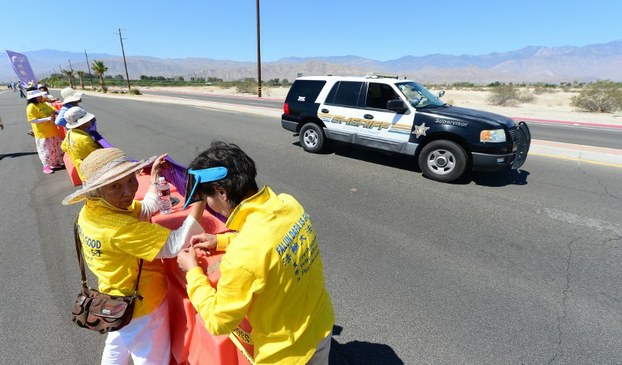China: Lawyers barred from Dalian Falun Gong trial
| Publisher | Radio Free Asia |
| Publication Date | 21 June 2013 |
| Cite as | Radio Free Asia, China: Lawyers barred from Dalian Falun Gong trial, 21 June 2013, available at: https://www.refworld.org/docid/51cbfc0837.html [accessed 26 May 2023] |
| Disclaimer | This is not a UNHCR publication. UNHCR is not responsible for, nor does it necessarily endorse, its content. Any views expressed are solely those of the author or publisher and do not necessarily reflect those of UNHCR, the United Nations or its Member States. |
2013-06-21
 Falun Gong practitioners protest the visit of Chinese President Xi Jinping to the US in California, June 7, 2013. AFP
Falun Gong practitioners protest the visit of Chinese President Xi Jinping to the US in California, June 7, 2013. AFP
Authorities in the northeastern Chinese province of Liaoning barred a team of defense attorneys from attending the trial of 13 members of the banned Falun Gong spiritual movement on Friday, lawyers said.
The trial of 13 Falun Gong followers went ahead as scheduled on Friday in Xigang District People's Court in the port city of Dalian.
But Li Subin and Guo Haiyue, who formed part of an 11-member defense team, all of whom were staying at the same hotel, said they weren't allowed into the courtroom.
"I didn't [get in], and I was one of the defense team," Li told RFA on Friday. "The court officials flouted the law, even as they were supposed to be enforcing it."
But he declined to comment further. "It's not convenient for me to speak to you right now," Li said. "I will write about this on the microblogs."
Guo also confirmed in a brief interview that he had been prevented from entering the courtroom.
"I didn't get in," he said. "But we'll have to talk another time, because we are not in a safe place right now, and all our cell phones are being monitored."
Call for assistance
The raids were described on Twitter by Guangzhou-based rights lawyer Tang Jitian, who said fellow defense team members Cheng Hai and Liang Xiaojun were also targeted.
In an interview on Friday, Tang said the lawyers had contacted justice department officials for assistance after Dalian police arrived at the hotel late on Thursday.
"The police banged on the door for a while, but we didn't open up, and they left," Tang said. "To judge from the sound, there were about four or five of them."
"They were paying a so-called 'visit' on us, to warn us [not to go ahead]."
Tang, who was helping the defense team, said more police appeared to have arrived at the hotel than the ones he saw, however.
"There were a lot of police vehicles outside, and they'd been there since [Wednesday] night," said Tang, who was also denied permission to enter the public gallery of the court.
Beijing rights lawyer Xiao Guozhen said it was illegal to prevent defense lawyers from attending a trial.
"It is the most important part of normal court procedures, that the accused exercise their right to a defense lawyer," Xiao said.
"Secondly, lawyers have a right to carry out their legitimate business, which doesn't obstruct the running of the court, so [their actions] are against the law and against procedure."
Banned movement
China banned the Falun Gong, which claims tens of millions of followers in China and abroad, in July 1999, after the group staged a massive silent protest outside the main leadership compound in Beijing.
The official Chinese media have consistently portrayed Falun Gong as a fringe, fanatical sect, often referring to it as an "evil cult."
Human rights groups estimate that hundreds of Falun Gong followers have been jailed and tens of thousands sent to labor camps without trial since then.
Out of more than 204,000 lawyers in China, only a few hundred risk taking on cases that deal with human rights, particularly when linked to the rights of Falun Gong followers, according to Amnesty International.
China has launched a clampdown in recent years on its embattled legal profession, with many civil rights law firms struggling to renew their licenses.
Rights groups say there is little purpose to the annual licensing scheme for lawyers and law firms, besides the exertion of state control over the legal profession.
New rules introduced in the past two years ban lawyers from defending certain clients, and leave them vulnerable to being charged themselves with subversion if they defend sensitive cases.
Reported by Qiao Long for RFA's Mandarin Service. Translated and written in English by Luisetta Mudie.
Link to original story on RFA website
